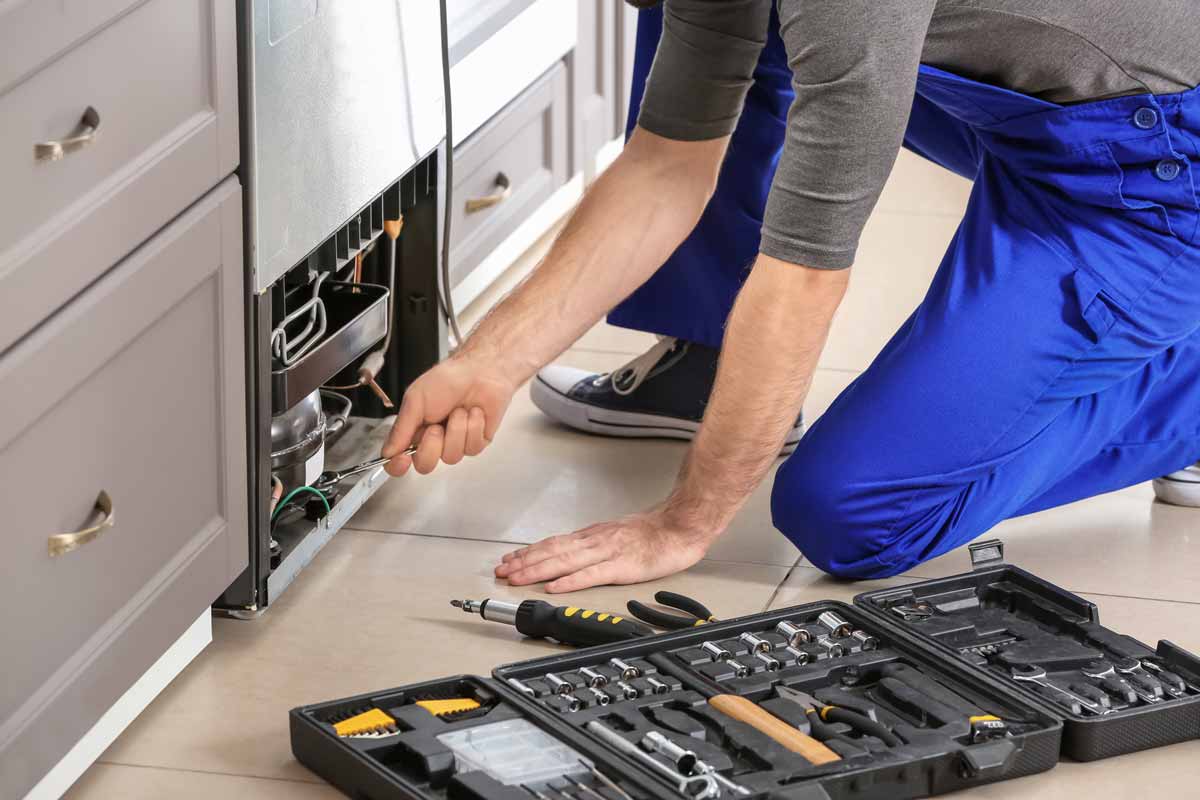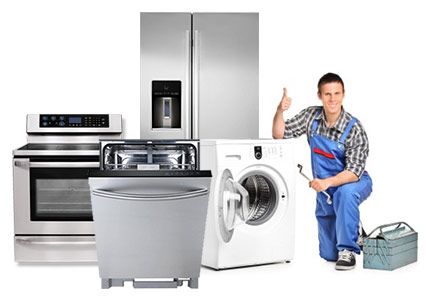The Ultimate Guide to Comprehending Appliance Repair Work in your home
When your fridge stops cooling or your stove rejects to heat, it can really feel overwhelming. Understanding home appliance repair service in the house can conserve you money and time. You'll learn to identify signs, use necessary tools, and follow a methodical troubleshooting process. However prior to you start, there are critical safety precautions you require to think about. What are the most usual problems, and how can you fix them? Let's check out the basics.
Common Appliance Issues and Their Signs
When your appliances begin acting up, it's vital to recognize the indications at an early stage. Neglecting them can lead to bigger problems and costly fixings. For example, if your fridge isn't cooling correctly, you may observe warm places or condensation forming. This could indicate a stopping working compressor or a blocked vent.Your dishwashing machine may reveal issues with dirty meals or unusual sounds throughout cycles. If you hear grinding or clanking, it's time to investigate.A washing device that will not spin or drain can leave you with soaked laundry, suggesting a clogged up drain or a malfunctioning pump.Lastly, if your oven's temperature level appears off or it takes forever to preheat, you could be managing a defective thermostat. By staying alert to these signs and symptoms, you can address problems prior to they rise into major fixings.
Crucial Devices for Home Appliance Repair
When you're tackling device repairs at home, having the right tools is crucial. Basic hand tools like screwdrivers and pliers will certainly assist you disassemble and repair different appliances, while electrical testing tools ensure you're functioning securely with wiring. Let's discuss what you require to get begun on your repair trip.
Fundamental Hand Devices
Having the right tools is vital for efficient home appliance repair work at home. Start with a reputable screwdriver collection, including both flathead and Phillips types, as screws are usual in appliance setting up. Pliers are also essential; they help with gripping, twisting, and reducing cords or little components. A set of needle-nose pliers can reach tight places quickly. You'll need a good flexible wrench for tightening or loosening nuts and bolts. An utility knife is handy for cutting with packaging or insulation. Do not neglect a strong workbench or surface area to safely organize your devices and components. With these fundamental hand devices, you'll be well-prepared to deal with most device repair work that come your method.
Electrical Screening Gadgets
Along with basic hand devices, electric testing gadgets play a crucial function in home appliance fixing. These tools aid you diagnose electrical problems and warranty home appliances function safely. A multimeter is vital; it determines voltage, existing, and resistance, allowing you to identify troubles quickly. A non-contact voltage tester is one more essential, letting you spot real-time cords without making straight contact, enhancing your security. Secure meters are terrific for gauging current flow in cables without separating them, saving you effort and time. In addition, circuit testers can quickly inspect if outlets are functioning properly. By utilizing these tools, you'll simplify your troubleshooting process and boost your repair work abilities, making home appliance upkeep a lot much easier.
Step-by-Step Overview to Diagnosing Home Appliance Issues
When your home appliance breaks down, it can be aggravating, however detecting the concern does not have to be frustrating. You'll find out to recognize typical issues and apply efficient repairing methods. Let's walk through the actions to get your home appliance back in working order.
Common Appliance Problems

Troubleshooting Techniques Explained

Fixing Significant Kitchen Devices: A Closer Look
Have you ever before asked yourself how to take on typical issues with your cooking area appliances? Repairing major kitchen home appliances like refrigerators, stoves, and dishwashers can be simpler than you believe. Beginning by identifying the trouble-- whether it's a fridge not cooling down or a stove that won't warm. Usually, a straightforward reset or inspecting the power source can address the issue.For fridges, tidy the condenser coils and examine the door seals. If your oven's not heating, evaluate the burner and thermostat. Dishwashers may simply require a tidy filter or a reset to get them back in action. Always unplug the device prior to diving into repair work to ensure your safety.Don' t fail to remember to seek advice from the customer handbook for certain fixing ideas associated to your version. With a little persistence and the right tools, you can with confidence deal with device fixings and conserve money at the same time!

Repairing Laundry Equipments: Tips and Techniques
When your washing appliances start breaking down, it can feel frustrating, but repairing them doesn't need to be a trouble. Begin by examining the power supply. Verify the device is connected in and the electrical outlet is functioning. Next off, examine the door or check these guys out cover button; a defective button can avoid the machine from operating.For washing machines, if it's not rotating, look for unbalanced tons. Rearranging the clothing might fix the issue. If your dryer isn't home heating, clean the dust filter and check the air vent for blockages.Listen for uncommon sounds; they can suggest a trouble. If your appliance is leaking, inspect the hose pipes for fractures or loosened connections. File any error codes displayed on electronic screens, as they can lead you in identifying the issue. Lastly, speak with the user guidebook for certain repairing suggestions why not look here connected to your design.
Security Precautions to Take During Repair works
Before you begin any device repair services, it's necessary to prioritize safety to prevent accidents or injuries. Unplug the appliance or transform off the circuit breaker to guarantee no power reaches it while you work. Use protected tools to decrease the danger of electrical shock. Put on safety and security goggles and handwear covers to secure yourself from sharp edges or debris (Dryer repair Oro Valley Dependable Refrigeration & Appliance Repair Service).Make particular your work area is clean and well-lit, so you can see what you're doing. Maintain youngsters and pets far from the area to prevent disturbances and potential dangers. If you're taking care of gas devices, be extra careful; check for leaks prior to proceeding.Take your time, and don't hurry via repair services. If you really feel unsure about any kind of action, it's far better to pause and research study than to presume. Adhering to these precautions will aid produce a much safer setting for your DIY device repair work job
When to Call a Specialist for Assistance
Exactly how do you understand if it's time to contact a specialist for appliance repair work? If you've tried fundamental troubleshooting without success, it's a clear sign. If your home appliance still will not begin or shows uncommon sounds after resetting it, do not think twice to seek professional help.When you observe leakages, smoke, or melting scents, focus on security and call a professional instantly. These problems can lead to even more substantial damages or position risks to your home.Also, if your appliance is under service warranty, speaking to a professional is frequently the best route. They can assure that repairs won't void your warranty, conserving you cash in the lengthy run.Finally, if you're unsure or uneasy with intricate repair services, it's important to leave it to the specialists. Keep in mind, tackling complicated problems without the right proficiency can bring about pricey blunders. Depend on a professional when in uncertainty!
Regularly Asked Inquiries
Just How Can I Stop Appliance Problems in the Future?
To avoid device problems in the future, you need to do routine upkeep, look for wear and tear, tidy filters, and avoid overloading. Remaining proactive will certainly help extend their life-span and maintain them running efficiently.
What Are the Most Usual DIY Appliance Fixing Mistakes?
You may forget safety and security precautions, skip repairing steps, or make use of inaccurate tools when attempting do it yourself appliance repair services. Hurrying the process or overlooking manufacturer guidelines can bring about more considerable concerns and costly errors. Keep client and informed!
Exactly how Do I Know if a Component Needs Substitute?
You can tell if a component needs substitute by inspecting for unusual sounds, leakages, or inconsistent performance. If the home appliance has a vacuum repairs hard time to operate appropriately or shows visible damage, it's likely time for a substitute.
Can I Make Use Of Generic Components for Appliance Repairs?
Yes, you can use common components for device fixings, however identify they work - Dependable Refrigeration & Appliance Repair Service Dryer repair near me. Generic parts might save you money, yet they might impact efficiency or durability, so consider your options thoroughly before making a decision
What Warranties Cover Device Fixes?
Most home appliance guarantees cover repair work for manufacturing problems, yet they commonly omit damages from misuse. Examine your guarantee terms very carefully, as some might require utilizing certified professionals and initial components for coverage to continue to be valid.